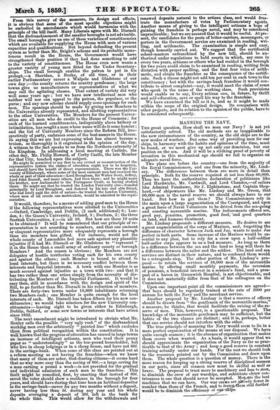MANNING THE NAVY.
THE great question, How shall we man our Navy ? is not yet satisfactorily solved. The old methods are as inapplicable to the new circumstances of the country, as the old ships are to the new modes of warfare. But some way of providing men for our ships, in harmony with the habits and opinions of the time, must be found, or we must give up not only our dominion, but our position on the sea. And it will be a striking proof of poverty of invention in this mechanical age should we fail to organize an adequate naval force.
Two plans are before the country—one from the majority of the Royal Commissioners, and one from the minority, Mr. Lind- say. The differences between them are more in detail than principle. Both fix the reserve required at not less than 60,000. Thus we have the authoritative declaration of politicians like Lord Hardwicke, Mr. Cardwell, and Lord Chandos,—of sailors like Admiral Fanshawe, Sir J. Elphinstone, and Captain Shep- herd,—of shipowners like Mr. Lindsay and Mr. elreen, that 60,000 men is the naval reserve we should always have to our hand. But how to get them ? The Commissioners rely in the main upon a large augmentation of the Coastguard, and upon a great force of Naval Volunteers to be drived from the sea-going and coasting mercantile marine. The inducements offered are, good pay, pensions, promotion, good food, "and good quarters on land, and humane treatment.
Mr. Lindsay propounds a different measure. He desires to see a great augmentation of the corps of Marines, and, forgetting the difference of character between Jack and Joe, wants to make Joe perfect in both parts. Some increase of the Marines would be es- sential to any plan, but to rely for a crew upon a half-soldier half-sailor corps appears to us a bad measure. As long as there is a difference between the sea and the land so long will there be a difference between the sailor and the soldier. The land and sea services are distinct in their nature, and to confound them would be a retrograde step. The other portion of Mr. Lindsay's pro- posal — to retain the services of 18,000 men of the mercantile marine by offering small monthly payments, the reversion of pensions, a beneficial interest in a seamen's fund, and a pros- pect of a haven in Greenwich Hospital, is not objectionable, and it does not materially differ from that of his colleagues on the Commission.
Upon one important point all the commissioners are agreed— that boys should be regularly trained at the rate of 2000 per annum for both the Navy and the merchant service.
Another proposal by Mr. Lindsay is that a reserve of officers should be drawn from " the gentlemen of the mercantile marine," a measure, he thinks, that would facilitate the raising of the re- serve of men. This, however, is a questionable proposal. The knowledge of the mercantile gentlemen may be sufficient, but the habits of the two classes are distinct; and it is, perhaps, better that one service should not interfere with the other.
The true principle of manning the Navy would seem to lie in a more perfect organization of the means at our disposal. We have quite enough seamen ; it is the absence of organization that makes them scarce when wanted. As a basis, it would appear that we should approximate the organization of the Navy as far as prac- ticable to that of the Army ; and keep a good reserve in constant training actually under our hands. For the rest we should look to the resources pointed out by the Commission and draw upon them. The whole question is a question of money. There is the more reason for keeping up a strong reserve of disciplined seamen in our ports, since all seamen now must be skilful as well as brave. The proposal to trust more to machinery and less to men, to diminish the crew of our warships, and substitute olcv,cr con- trivances is one that should never be accepted. Me the best
would be to diminish the efficiency of o machines that we can have. Our war crews are ady fewer in
number than those of the French, and to lease em still further Pe.


























 Previous page
Previous page